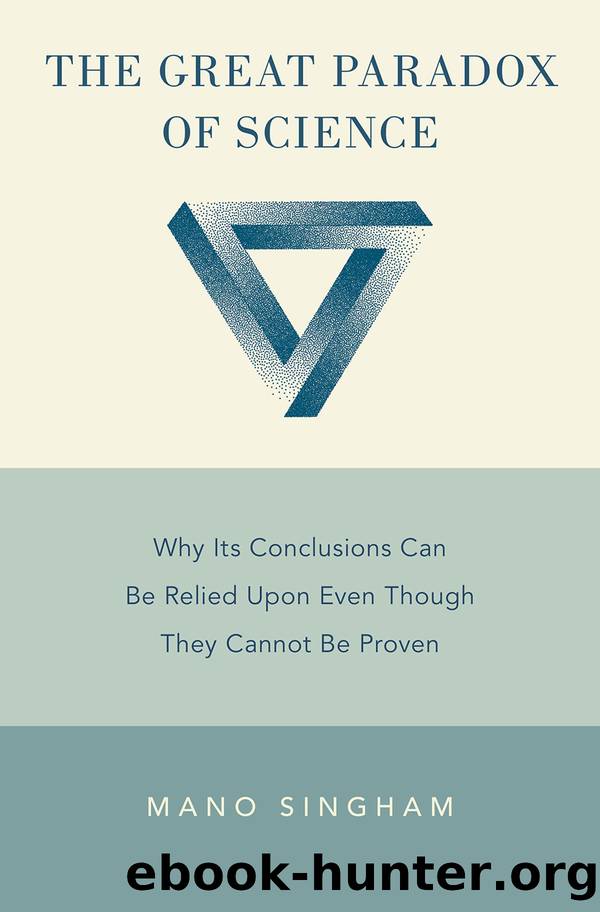The Great Paradox of Science by Singham Mano;

Author:Singham, Mano; [Singham, Mano;]
Language: eng
Format: epub
ISBN: 9780190055059
Publisher: OxfordUP
Published: 2019-09-15T00:00:00+00:00
Newtonâs theory of gravitation also seemed, by the standards of that time, to be bordering on the occult since he was arguing that space consisted of a vacuum and that inanimate objects like the Sun and Moon and anything else that had mass exerted invisible forces on each other that could span vast distances of empty space and act instantaneously. His invoking of gravity as an innate force that was just there and did not have a mechanical explanation was reflective of an earlier way of thinking that had been rejected by his contemporaries and was seen by them as a reversion to older, borderline heretical ideas that attributed occult properties to matter (Butterfield 1957, 157). That would have been a difficult idea to stomach and indeed Newton was accused by Gottfried Wilhelm Leibniz of abandoning the goal of specifying a completely mechanical universe and reintroducing occult principles (Shapin 1996, 63). By saying that he had no choice in the matter and that he was forced to his conclusions by the data, Newton could deflect the charge that he was indulging in mere hypothetical speculations or the occult and claim that his knowledge was certain, thus implying infallibility and inevitability.
Even if Newtonâs assertions of the inevitability and thus uniqueness of his theories were merely a rhetorical strategy on his part to overcome opposition to his theory, he would not be the last to adopt it. Andre Ampere (1775â1836) said in his treatise on electricity that he had followed Newtonâs example and that his own laws were also deduced only from observed facts. Here are Ampereâs own words as quoted by Duhem:
To observe the facts first, to vary their circumstances as far as possible, to make precise measurements along with this first task in order to deduce from them general laws based only on experience, and to deduce from these laws, independently of any hypothesis about the nature of the forces producing the phenomena, the mathematical value of these forces, i.e., the formula representing themâthat is the course Newton followed. It has been generally adopted in France by the scientists to whom physics owes the enormous progress it has made in recent times, and it has served me as a guide in all my research on electrodynamic phenomena. I have consulted only experience in order to establish the laws of these phenomena, and I have deduced from them the formula which can only represent the forces to which they are due; I have made no investigation about the cause itself assignable to these forces, well convinced that any investigation of this kind should be preceded simply by experimental knowledge of the laws and of the determination, deduced solely from these laws, of the value of the elementary force. (Duhem 1906, 196)
Download
This site does not store any files on its server. We only index and link to content provided by other sites. Please contact the content providers to delete copyright contents if any and email us, we'll remove relevant links or contents immediately.
Essentials of Geology by Stephen Marshak(422)
Hydrocarbon transformations in sediments from the Cathedral Hill hydrothermal vent complex at Guaymas Basin, Gulf of California ââ¬â A chemometric study of shallow seep architecture by unknow(321)
Spectral Geometry and Inverse Scattering Theory by Huaian Diao & Hongyu Liu(302)
Probably Overthinking It: How to Use Data to Answer Questions, Avoid Statistical Traps, and Make Better Decisions by Allen B. Downey(289)
The Readable Darwin by Pechenik Jan A.;(276)
How to succeed in EPSO numerical reasoning tests by Franco Reverte José María(266)
Research and Publication Ethics by Santosh Kumar Yadav(261)
Subtle Is the Lord: The Science and the Life of Albert Einstein by Abraham Pais(257)
Great Ways to Learn Anatomy and Physiology by McKissock Charmaine;(255)
Mathematical Models in Economics. Lections by Shananin(255)
Quantum International Relations by James Der Derian(253)
Weathering: Types, Processes and Effects: Types, Processes and Effects by Matthew J. J. Colon(250)
Dark Matter in the Universe by John N. Bahcall(245)
Cosmic Rays by Alessandro De Angelis(244)
Mathematics Booster-1 by Singh Manoj Kumar(227)
Fusion of Defects by Arthur Bartels; Christopher Douglas; André Henriques(226)
The Structure of Scientific Inference by Mary B. Hesse(225)
Pearls from a Lost City: The LVOV School of Mathematics (History of Mathematics) (History of Mathematics, 40) by Roman Duda(219)
Social Insects: Structure, Function, and Behavior : Structure, Function, and Behavior by Emily M. Stewart(217)
